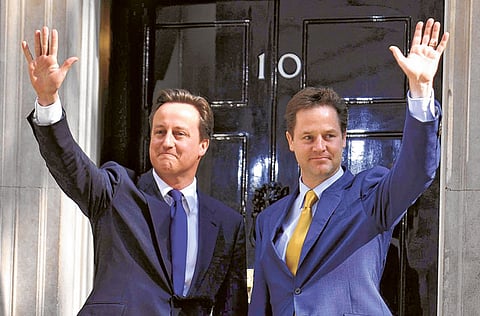Clegg looks at next polls
The Liberal Democrat leader has failed to benefit from the hacking scandal. But he's safe at the helm of his party

Before he took his party into the coalition and U-turned on tuition fees, it was newspapers that sapped Nick Clegg's popularity. When the Liberal Democrat leader looked set to prosper at last year's general election, the right-wing press mauled him. He may have hoped in recent weeks that newspapers would inadvertently be the cause of his revival, too: the Lib Dems had little to do with the tainted Murdoch empire, which was cultivated for years by both the Conservatives and the Labour Party. Voters would surely give Clegg credit — wouldn't they?
Apparently not. The Lib Dems continue to languish at around 12 per cent in the polls, roughly half the level of support they won last year. Clegg's personal ratings have not been boosted either: a ComRes poll released on July 25 showed that only 4 per cent of voters had a higher opinion of him after the scandal; 22 per cent viewed him less favourably, and 74 per cent did not change their minds.
This may be down to popular indifference to the furore. Even its biggest beneficiary, Ed Mililband, has gained only slightly: just 10 per cent of voters said their view of the Labour leader had improved. It might not help that the Lib Dems' loudest critic of Rupert Murdoch is not their leader but the business secretary, Vince Cable (who last year indicated to undercover journalists that he wanted to block News Corporation's now-aborted bid to buy the chunk of BSkyB that it does not already own). Another explanation is simply that the coalition has elided the Lib Dems with the Tories in many voters' minds. Yet despite its failure to capitalise, the mood at the top of the party is surprisingly sanguine. Clegg's leadership, which had looked vulnerable, is safe. His main rival, Chris Huhne, the energy secretary, is dogged by claims that he evaded penalties for a motoring offence in 2003.
Unifying cause
Clegg has delivered the cooler, more businesslike relationship with the Tories that he promised his party after the failure of the campaign to change the voting system in a referendum in May. Senior Conservatives who a year ago preferred the Lib Dems to the right of their own tribe now curse them as enemies of reform. Clegg helped to water down the planned overhaul of the NHS. He can look forward to a less rocky party conference in the autumn than he was once anticipating. And he is already looking to the next election and beyond. Another hung parliament could again leave him deciding which of the main parties will govern; he is said to be contemplating what the Lib Dems' main demand should be in a fresh bout of coalition negotiations. Finding another unifying cause in a party divided between market-friendly liberals and social democrats will be tough.
The conundrum of what kind of party the Lib Dems are hasn't gone away. The polls say the party's left-leaning voters have deserted it — yet the concessions the Lib Dems demand within government, such as the diluted NHS bill, are still left-wing. For years, voters questioned whether the Lib Dems were serious about governing, and wondered what they stood for. Only the first doubt has been settled.
— The Economist


